NEWS
Siedle Klingel / Türöffner mit ESP8266 und MQTT
-
@basti97 Hi Basti
Ich habe diese Quelle für mich angepasst, bzw. einfach um die WS2812 Funktionen erweitert:Master-repo: marelab/esp-rfid
Du kannst über MQTT so ziemlich alles machen. Hier mal ein Auszug aus der API:
- Reading all user data over MQTT
- Sending User data to RFID-DOOR/ESP-RFID over MQTT
- Sending door open command over MQTT
- Sending Sync of a RFID-DOOR (IP/Hostname) over MQTT
- Configure Sync interval over ESP-RFID GUI
- Deleting all User of a ESP-RFID device over MQTT
Die Befehle müssen als JSON gesendet werden. Z.B. Tür öffnen mit;
{ cmd:'opendoor', doorip:'(The ESP-RFID IP of the door to open as String)' }Es gibt auch eine fertige Hardware, die ohne weitere Komponenten auskommt.
Diese findest du hier: maelab RFID-DOORGrüße Eisbaeeer
-
Hallo Zusammen,
mal eine offtopic Frage. Da auf den Bildern hier auch Videosprechanlagen zu sehen sind, kennt jemand eine Möglichkeit das analoge Videosignal in den ioBroker zu bekommen? Ziel wäre, wenn jemand bei Abwesentheit an der Tür klingelt, ein Foto per Telegram aufs Handy zu bekommen.
Gruß
-
@pk68 Hatte ich auch darüber nachgedacht, dann aber verworfen. Stattdessen in das Aussengehäuse ein Loch gebohrt und eine zusätzliche Fish-eye-Linse (75mm Kabel) mit ESP32 (Materialkosten <10 Euro)untergebracht und bekomme jetzt Fotos der Klingelnden per Telegram

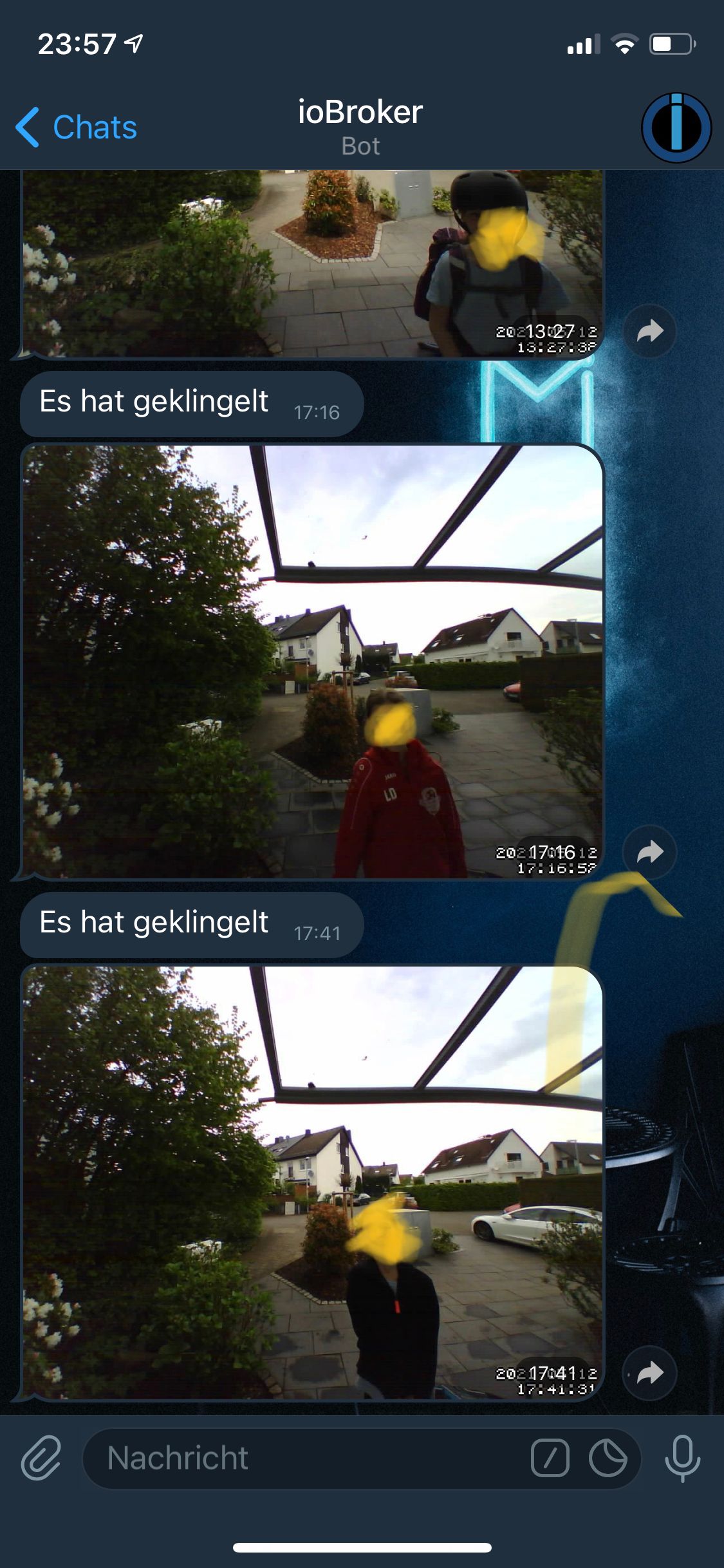
-
@floxd Ja genau so eine Lösung schwebt mir vor.
 Leider ist diese Lösung bei einem Mehrfamilienhaus nicht realisierbar.
Leider ist diese Lösung bei einem Mehrfamilienhaus nicht realisierbar. -
@eisbaeeer Danke wie wird dann aus den Siedle Bus ausgewertet. Ob es nun oben (Wohnungstür) oder unten (Haustür) klingelt.
Weißt du wo ich das Abgreifen kann und wie ich das umwandeln muss. -
@basti97 Hi. Bei Siedle wird das mit 7.1 und 7.2 unterschieden. Die Punktierung sind die entsprechenden Stockwerke bzw. Wohnungen. Schau dir mal das Schaltbild der Siedle Anlage an. Da sieht man das ganz gut.
Die RFID Schaltung wertet aber das Türklingeln nicht mit aus. Das musst du dann schon an dem jeweiligen Handapparat machen. -
@michif100 said in Siedle Klingel / Türöffner mit ESP8266 und MQTT:
Hallo zusammen,
bei mir klappt alles wunderbar, also mit HTS-811 und 18/24 V DC.
Benutze eine 20V Z-Diode und 480 Ohm Widerstand vor dem Ontokoppler.
Aktuell betreibe ich die NodeMCU per USB.habe bei mir die gleiche Siedle Anlage verbaut und habe ein paar Fragen an dich. Hoffe du kannst mir behilflich sein damit ich zukünftig auch mein Klingelsignal im ioBroker habe

An welchen Klemmen von Siedle hast du den die Bauteile angeklemmt?
Wo hast du die Spannung abgenommen? -
@claus1993 Hatte ich schon hier beschrieben.
Du benötigst die Klemmen 7 und 1. Die Versorgungsspannung musst du dir irgend wo herholen. Im besten Fall hast du noch 2 Adern frei und kannst dir vom Netzteil die benötigte Spannung holen.
Gruß Eisbaeeer -
@eisbaeeer
Ich habe diese Klingel von Siedle mit folgender Bezeichnung HTS 71101Und so sieht die Platine aus. Bis jetzt habe ich nur das Etagen Klingeln abgegriffen.
Die weiteren Punkte habe ich noch nicht gefunden.
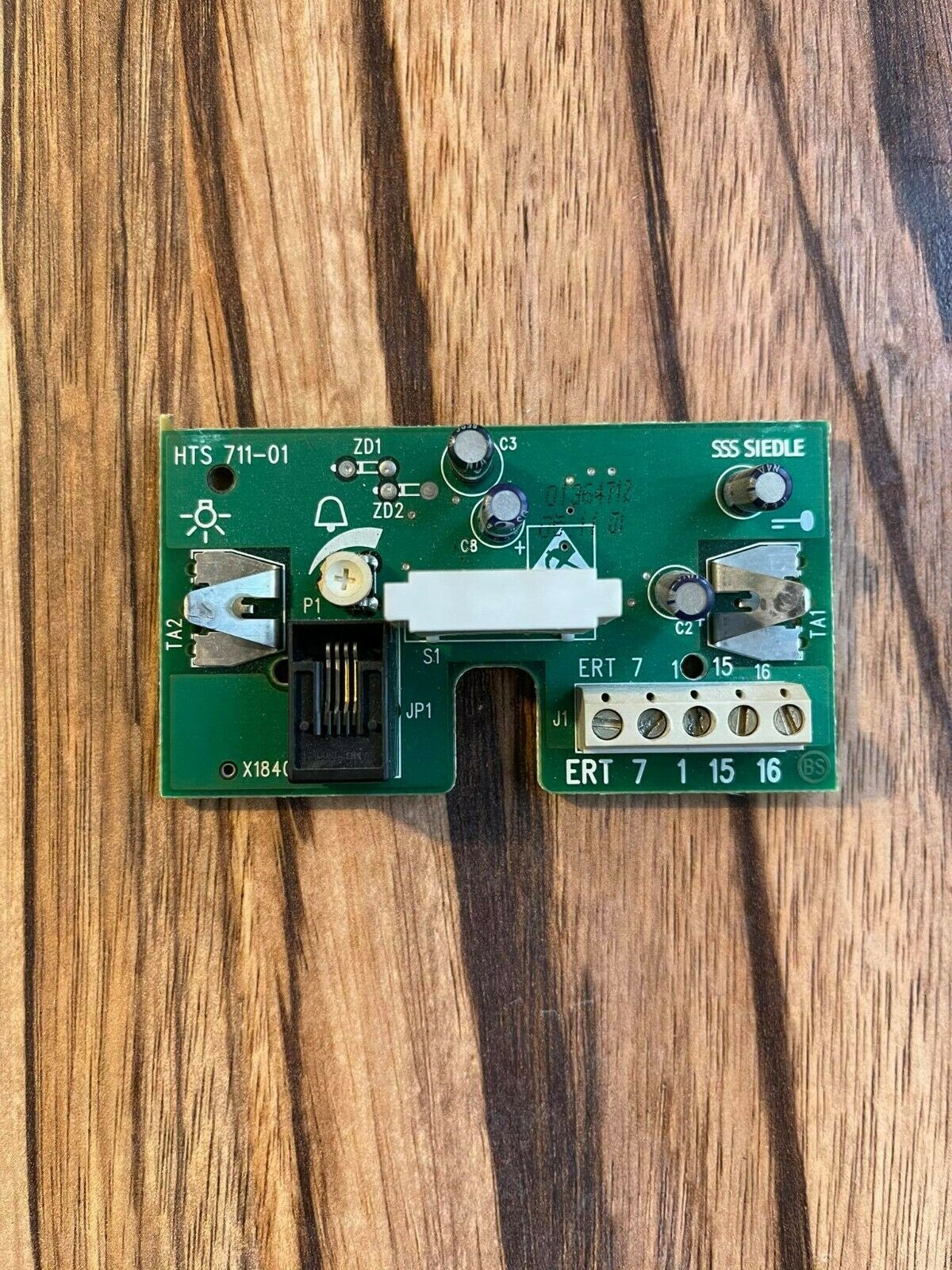
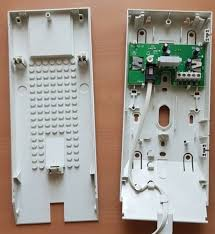
Wenn ich das richtig gelesen habe kann ich nur mit der Software meine Tür per RFID öffnen bzw verwalten. Da ich mich bis jetzt sonst noch nie mit Bus fähigen Klingelanlagen beschäftigt habe.
-
@banjo89 Ich habe zwar unten bereits ein Kommentar wie man die Siedle HTS711 smart machen kann. Nun habe ich gesehen das du die gleiche Version wie ich habe. Kannst du mir bitte mal Beschreiben wie du das ganze umgesetzt hast + benötigte Bauelemente. Bis jetzt werte ich nur den Etagen Klingel per Logo 8 aus. Bei dir sieht es auf dem ersten Blick so einfach aus.

Danke für deine Hilfe

-
@Banjo89 Kannst du mir bitte dein Schaltplan zu deiner siedle schicken da ich verscheinlich eine ähnliche habe.


-
@eisbaeeer kannst deinen Umbau mit rfid mal ein wenig genauer erläutern/Pläne ergänzen? Finde die Idee mega!
-
Edit: Hat sich erledigt. Läuft super! Besten Dank. Lag an einer kalten Lötstelle.
Vlg
Hallo zusammen,
ich bin neu im Forum und habe eine Frage bezüglich der ESP8266 mit einer Siedle HTA 711-01
Es liegt zwischen 1 und 7 20V Spannung an und ich bin nach Eisbeers Bauplan vorgeganen.
Zur Ausführung des Scipts verwende ich einen ESP8266 mit einem Arduino Script:
// https://www.mikrocontroller.net/topic/444994?goto=new#new #include <ESP8266WiFi.h> #include <WiFiUdp.h> #include <WiFiClientSecure.h> #include <UniversalTelegramBot.h> #include <ArduinoJson.h> //------------------------------------------------ // configuration with fix ip //------------------------------------------------ // MAC-ID: // Telegram BOT Token (Get from Botfather) #define botToken "********************************************" WiFiClientSecure secured_client; UniversalTelegramBot bot(botToken, secured_client); //Deine User ID oder Chat_ID #define userID "********************************************" X509List cert(TELEGRAM_CERTIFICATE_ROOT); // wlan param const char* ssid = "********************************************"; const char* WLANKEY = "********************************************"; // sip params const char *sipip = "192.168.5.1"; int sipport = 5060; const char *sipuser = "********************************************"; // angelegter Nutzername vom Telefoniegerät const char *sippasswd = "********************************************"; // PW vom Nutzername vom Telefoniegerät // dial params const char *sipdialnr = "**701"; // Rundruf an alle const char *sipdialtext = "Haustuer"; // network params const char *ip = "192.168.5.20"; // ESP IP Adresse eintragen const char *gw = "192.168.5.1"; const char *mask = "255.255.255.0"; const char *dns = "192.168.5.1"; //------------------------------------------------ #define DEBUGLOG WiFiUDP Udp; ///////////////////////////////////////////////////////////////////////////////////////////////////// // // hardware and api independent Sip class // ///////////////////////////////////////////////////////////////////////////////////////////////////// class Sip { char *pbuf; size_t lbuf; char caRead[256]; const char *pSipIp; int iSipPort; const char *pSipUser; const char *pSipPassWd; const char *pMyIp; int iMyPort; const char *pDialNr; const char *pDialDesc; uint32_t callid; uint32_t tagid; uint32_t branchid; uint32_t iAuthCnt; // original 'int' uint32_t iRingTime; uint32_t iMaxTime; uint32_t iDialRetries; // original 'int' int iLastCSeq; void AddSipLine(const char* constFormat , ... ); bool AddCopySipLine(const char *p, const char *psearch); bool ParseParameter(char *dest, int destlen, const char *name, const char *line, char cq = '\"'); bool ParseReturnParams(const char *p); int GrepInteger(const char *p, const char *psearch); void Ack(const char *pIn); void Cancel(int seqn); void Bye(int cseq); void Ok(const char *pIn); void Invite(const char *pIn = 0); uint32_t Millis(); uint32_t Random(); int SendUdp(); void MakeMd5Digest(char *pOutHex33, char *pIn); public: Sip(char *pBuf, size_t lBuf); void Init(const char *SipIp, int SipPort, const char *MyIp, int MyPort, const char *SipUser, const char *SipPassWd, int MaxDialSec = 10); //10 void HandleUdpPacket(const char *p); bool Dial(const char *DialNr, const char *DialDesc = ""); bool IsBusy() { return iRingTime != 0; } }; Sip::Sip(char *pBuf, size_t lBuf) { pbuf = pBuf; lbuf = lBuf; pDialNr = ""; pDialDesc = ""; } bool Sip::Dial(const char *DialNr, const char *DialDesc) { if (iRingTime) return false; iDialRetries = 0; pDialNr = DialNr; pDialDesc = DialDesc; Invite(); iDialRetries++; iRingTime = Millis(); return true; } void Sip::Cancel(int cseq) { if (caRead[0] == 0) return; pbuf[0] = 0; AddSipLine("%s sip:%s@%s SIP/2.0", "CANCEL", pDialNr, pSipIp); AddSipLine("%s", caRead); AddSipLine("CSeq: %i %s", cseq, "CANCEL"); AddSipLine("Max-Forwards: 70"); AddSipLine("User-Agent: sip-client/0.0.1"); AddSipLine("Content-Length: 0"); AddSipLine(""); SendUdp(); } void Sip::Bye(int cseq) { if (caRead[0] == 0) return; pbuf[0] = 0; AddSipLine("%s sip:%s@%s SIP/2.0", "BYE", pDialNr, pSipIp); AddSipLine("%s", caRead); AddSipLine("CSeq: %i %s", cseq, "BYE"); AddSipLine("Max-Forwards: 70"); AddSipLine("User-Agent: sip-client/0.0.1"); AddSipLine("Content-Length: 0"); AddSipLine(""); SendUdp(); } void Sip::Ack(const char *p) { char ca[32]; bool b = ParseParameter(ca, (int)sizeof(ca), "To: <", p, '>'); if (!b) return; pbuf[0] = 0; AddSipLine("ACK %s SIP/2.0", ca); AddCopySipLine(p, "Call-ID: "); int cseq = GrepInteger(p, "\nCSeq: "); AddSipLine("CSeq: %i ACK", cseq); AddCopySipLine(p, "From: "); AddCopySipLine(p, "Via: "); AddCopySipLine(p, "To: "); AddSipLine("Content-Length: 0"); AddSipLine(""); SendUdp(); } void Sip::Ok(const char *p) { pbuf[0] = 0; AddSipLine("SIP/2.0 200 OK"); AddCopySipLine(p, "Call-ID: "); AddCopySipLine(p, "CSeq: "); AddCopySipLine(p, "From: "); AddCopySipLine(p, "Via: "); AddCopySipLine(p, "To: "); AddSipLine("Content-Length: 0"); AddSipLine(""); SendUdp(); } void Sip::Init(const char *SipIp, int SipPort, const char *MyIp, int MyPort, const char *SipUser, const char *SipPassWd, int MaxDialSec) { caRead[0] = 0; pbuf[0] = 0; pSipIp = SipIp; iSipPort = SipPort; pSipUser = SipUser; pSipPassWd = SipPassWd; pMyIp = MyIp; iMyPort = MyPort; iAuthCnt = 0; iRingTime = 0; iMaxTime = MaxDialSec * 2000; // 1500 } void Sip::AddSipLine(const char* constFormat , ... ) { va_list arglist; va_start( arglist, constFormat); uint16_t l = (uint16_t)strlen(pbuf); char *p = pbuf + l; vsnprintf(p, lbuf - l, constFormat, arglist ); va_end( arglist ); l = (uint16_t)strlen(pbuf); if (l < (lbuf - 2)) { pbuf[l] = '\r'; pbuf[l + 1] = '\n'; pbuf[l + 2] = 0; } } // call invite without or with the response from peer void Sip::Invite(const char *p) { // prevent loops if (p && iAuthCnt > 3) return; // using caRead for temp. store realm and nonce char *caRealm = caRead; char *caNonce = caRead + 128; char *haResp = 0; int cseq = 1; if (!p) { iAuthCnt = 0; if (iDialRetries == 0) { callid = Random(); tagid = Random(); branchid = Random(); } } else { cseq = 2; if ( ParseParameter(caRealm, 128, " realm=\"", p) && ParseParameter(caNonce, 128, " nonce=\"", p)) { // using output buffer to build the md5 hashes // store the md5 haResp to end of buffer char *ha1Hex = pbuf; char *ha2Hex = pbuf + 33; haResp = pbuf + lbuf - 34; char *pTemp = pbuf + 66; snprintf(pTemp, lbuf - 100, "%s:%s:%s", pSipUser, caRealm, pSipPassWd); MakeMd5Digest(ha1Hex, pTemp); snprintf(pTemp, lbuf - 100, "INVITE:sip:%s@%s", pDialNr, pSipIp); MakeMd5Digest(ha2Hex, pTemp); snprintf(pTemp, lbuf - 100, "%s:%s:%s", ha1Hex, caNonce, ha2Hex); MakeMd5Digest(haResp, pTemp); } else { caRead[0] = 0; return; } } pbuf[0] = 0; AddSipLine("INVITE sip:%s@%s SIP/2.0", pDialNr, pSipIp); AddSipLine("Call-ID: %010u@%s", callid, pMyIp); AddSipLine("CSeq: %i INVITE", cseq); AddSipLine("Max-Forwards: 70"); // not needed for fritzbox // AddSipLine("User-Agent: sipdial by jl"); AddSipLine("From: \"%s\" <sip:%s@%s>;tag=%010u", pDialDesc, pSipUser, pSipIp, tagid); AddSipLine("Via: SIP/2.0/UDP %s:%i;branch=%010u;rport=%i", pMyIp, iMyPort, branchid, iMyPort); AddSipLine("To: <sip:%s@%s>", pDialNr, pSipIp); AddSipLine("Contact: \"%s\" <sip:%s@%s:%i;transport=udp>", pSipUser, pSipUser, pMyIp, iMyPort); if (p) { // authentication AddSipLine("Authorization: Digest username=\"%s\", realm=\"%s\", nonce=\"%s\", uri=\"sip:%s@%s\", response=\"%s\"", pSipUser, caRealm, caNonce, pDialNr, pSipIp, haResp); iAuthCnt++; } AddSipLine("Content-Type: application/sdp"); // not needed for fritzbox // AddSipLine("Allow: INVITE, ACK, CANCEL, OPTIONS, BYE, REFER, NOTIFY, MESSAGE, SUBSCRIBE, INFO"); AddSipLine("Content-Length: 0"); AddSipLine(""); caRead[0] = 0; SendUdp(); } // parse parameter value from http formated string bool Sip::ParseParameter(char *dest, int destlen, const char *name, const char *line, char cq) { const char *qp; const char *r; if ((r = strstr(line, name)) != NULL) { r = r + strlen(name); qp = strchr(r, cq); int l = qp - r; if (l < destlen) { strncpy(dest, r, l); dest[l] = 0; return true; } } return false; } // search a line in response date (p) and append on // pbuf bool Sip::AddCopySipLine(const char *p, const char *psearch) { char *pa = strstr((char*)p, psearch); if (pa) { char *pe = strstr(pa, "\r"); if (pe == 0) pe = strstr(pa, "\n"); if (pe > pa) { char c = *pe; *pe = 0; AddSipLine("%s", pa); *pe = c; return true; } } return false; } int Sip::GrepInteger(const char *p, const char *psearch) { int param = -1; const char *pc = strstr(p, psearch); if (pc) { param = atoi(pc + strlen(psearch)); } return param; } // copy Call-ID, From, Via and To from response // to caRead // using later for BYE or CANCEL the call bool Sip::ParseReturnParams(const char *p) { pbuf[0] = 0; AddCopySipLine(p, "Call-ID: "); AddCopySipLine(p, "From: "); AddCopySipLine(p, "Via: "); AddCopySipLine(p, "To: "); if (strlen(pbuf) >= 2) { strcpy(caRead, pbuf); caRead[strlen(caRead) - 2] = 0; } return true; } void Sip::HandleUdpPacket(const char *p) { uint32_t iWorkTime = iRingTime ? (Millis() - iRingTime) : 0; if (iRingTime && iWorkTime > iMaxTime) { // Cancel(3); Bye(3); iRingTime = 0; } if (!p) { // max 5 dial retry when loos first invite packet // int int uint32 int if (iAuthCnt == 0 && iDialRetries < 5 && (iWorkTime > (iDialRetries * 200)) ) { iDialRetries++; delay(30); Invite(); } return; } if (strstr(p, "SIP/2.0 401 Unauthorized") == p) { Ack(p); // call Invite with response data (p) to build auth md5 hashes Invite(p); } else if (strstr(p, "BYE") == p) { Ok(p); iRingTime = 0; } else if (strstr(p, "SIP/2.0 200") == p) // OK { ParseReturnParams(p); Ack(p); } else if ( strstr(p, "SIP/2.0 183 ") == p // Session Progress || strstr(p, "SIP/2.0 180 ") == p ) // Ringing { ParseReturnParams(p); } else if (strstr(p, "SIP/2.0 100 ") == p) // Trying { ParseReturnParams(p); Ack(p); } else if ( strstr(p, "SIP/2.0 486 ") == p // Busy Here || strstr(p, "SIP/2.0 603 ") == p // Decline || strstr(p, "SIP/2.0 487 ") == p) // Request Terminatet { Ack(p); iRingTime = 0; } else if (strstr(p, "INFO") == p) { iLastCSeq = GrepInteger(p, "\nCSeq: "); Ok(p); } } ///////////////////////////////////////////////////////////////////////////////////////////////////// // // hardware dependent interface functions // ///////////////////////////////////////////////////////////////////////////////////////////////////// int Sip::SendUdp() { Udp.beginPacket(pSipIp, iSipPort); Udp.write(pbuf, strlen(pbuf)); Udp.endPacket(); #ifdef DEBUGLOG Serial.printf("\r\n----- send %i bytes -----------------------\r\n%s", strlen(pbuf), pbuf); Serial.printf("------------------------------------------------\r\n"); #endif return 0; } // generate a 30 bit random number uint32_t Sip::Random() { // return ((((uint32_t)rand())&0x7fff)<<15) + ((((uint32_t)rand())&0x7fff)); return secureRandom(0x3fffffff); } uint32_t Sip::Millis() { return (uint32_t)millis() + 1; } void Sip::MakeMd5Digest(char *pOutHex33, char *pIn) { MD5Builder aMd5; aMd5.begin(); aMd5.add(pIn); aMd5.calculate(); aMd5.getChars(pOutHex33); } ///////////////////////////////////////////////////////////////////////////////////////////////////// // // Arduino setup() and loop() // ///////////////////////////////////////////////////////////////////////////////////////////////////// char caSipIn[2048]; char caSipOut[2048]; Sip aSip(caSipOut, sizeof(caSipOut)); void setup() { Serial.begin(115200); Serial.println(); WiFi.disconnect(true); delay(10); WiFi.mode(WIFI_STA); delay(10); WiFi.begin("********************************************", "********************************************"); // SSID und WLAN-Key eintragen Serial.print("Connecting"); while (WiFi.status() != WL_CONNECTED) { delay(100); Serial.print("."); } Serial.println(); Serial.print("Connected, IP address: "); Serial.println( WiFi.macAddress() ); Serial.println( WiFi.localIP() ); Serial.println( ESP.getChipId() ); int i = 0; for (i = 0; i < 100; i++) { if (WiFi.status() == WL_CONNECTED) break; delay(100); Serial.print("."); } if (i >= 100) { // without connection go to sleep delay(500); ESP.deepSleep(0); } WiFi.persistent(true); Serial.printf("\r\nWiFi connected to: %s\r\n", WiFi.localIP().toString().c_str()); Udp.begin(sipport); aSip.Init(sipip, sipport, ip, sipport, sipuser, sippasswd, 15); aSip.Dial(sipdialnr, sipdialtext); secured_client.setTrustAnchors(&cert); bot.sendMessage(userID, "Es hat an der Tür geklingelt!", ""); } int deepSleepDelay = 0; void loop(void) { int packetSize = Udp.parsePacket(); if (packetSize > 0) { caSipIn[0] = 0; packetSize = Udp.read(caSipIn, sizeof(caSipIn)); if (packetSize > 0) { caSipIn[packetSize] = 0; #ifdef DEBUGLOG IPAddress remoteIp = Udp.remoteIP(); Serial.printf("\r\n----- read %i bytes from: %s:%i ----\r\n", (int)packetSize, remoteIp.toString().c_str(), Udp.remotePort()); Serial.print(caSipIn); Serial.printf("----------------------------------------------------\r\n"); #endif } } aSip.HandleUdpPacket((packetSize > 0) ? caSipIn : 0 ); if (!aSip.IsBusy() && deepSleepDelay == 0) deepSleepDelay = millis(); if (deepSleepDelay && (millis() - deepSleepDelay) > 3000) { ESP.deepSleep(0); } }Das Script funktioniert und wenn ich GND und RST kurzschließe wird das Script ausgeführt.
Sobald ich das Konstrukt aus Zener Diode - Widerstand - Optokoppler an die Klingel anschließe und diese betätige, tut sich leider nichts.
Anbei noch eine Liste meiner verwendeten Bauteile:
Zener Diode
https://www.ebay.de/itm/380928180250?var=650272010680Ich hoffe mir kann hier jemand helfen

Eine Vermutung wäre, dass ich den Widerstand zu hoch gewählt habe?
Danke und VLG
Stefan
-
Hallo zusammen,
habe eine Siedle Anlage mit dem Netzteil BNG 650 im Keller und 3 x das Haustelefon AIB 150. Würde gerne das Klingelsignal abgreifen und den Türöffner betätigen. Gibt es hier schon eine Abhilfe/Ideen? Vielen Dank.
-
Hi, weiß jemand ob das mit einem Siedle HT 611-01 genau so funktioniert?
-
@med3 ja geht genau so. Habe ich hier auch im Einsatz.
-
Hallo Zusammen
Hat jemand Erfahrung mit einer Urmet 4+N (Innenstelle Urmet 1133 mit elektronischen Signalgeber) Erfahrung?
Welche Änderungen wären erforderlich bei Bedarf?
thx tom -
EDIT: Eben erst gesehen, du hast ja ein anderes Telefon mit einer anderen Spannung.
-
Ich habe mir das ganze auch gebaut aber mit Tasmota im Einsatz. Es fehlt eben noch ein Gehäuse.
Sobald es klingelt bekomme ich über mehre Kanäle eine Benachrichtigung (Telegram, Alexa)
Über mein normales Telegram Menü kann ich dann Türe öffnen auslösen.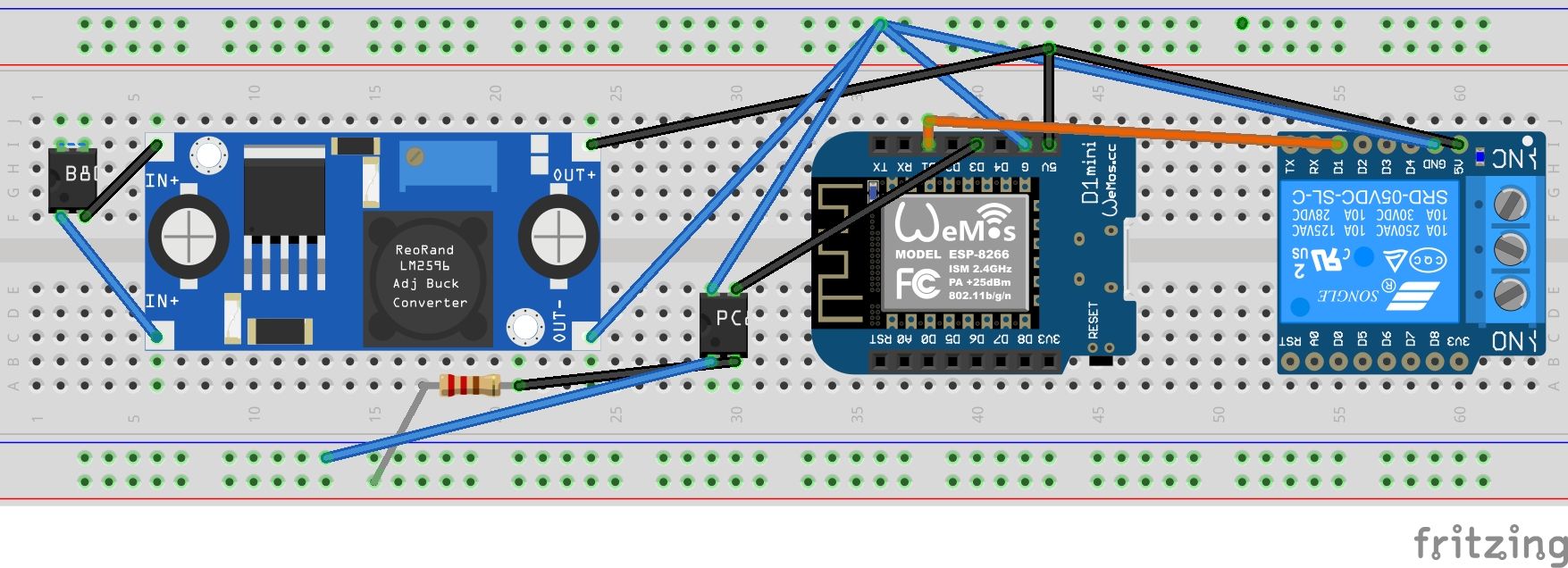
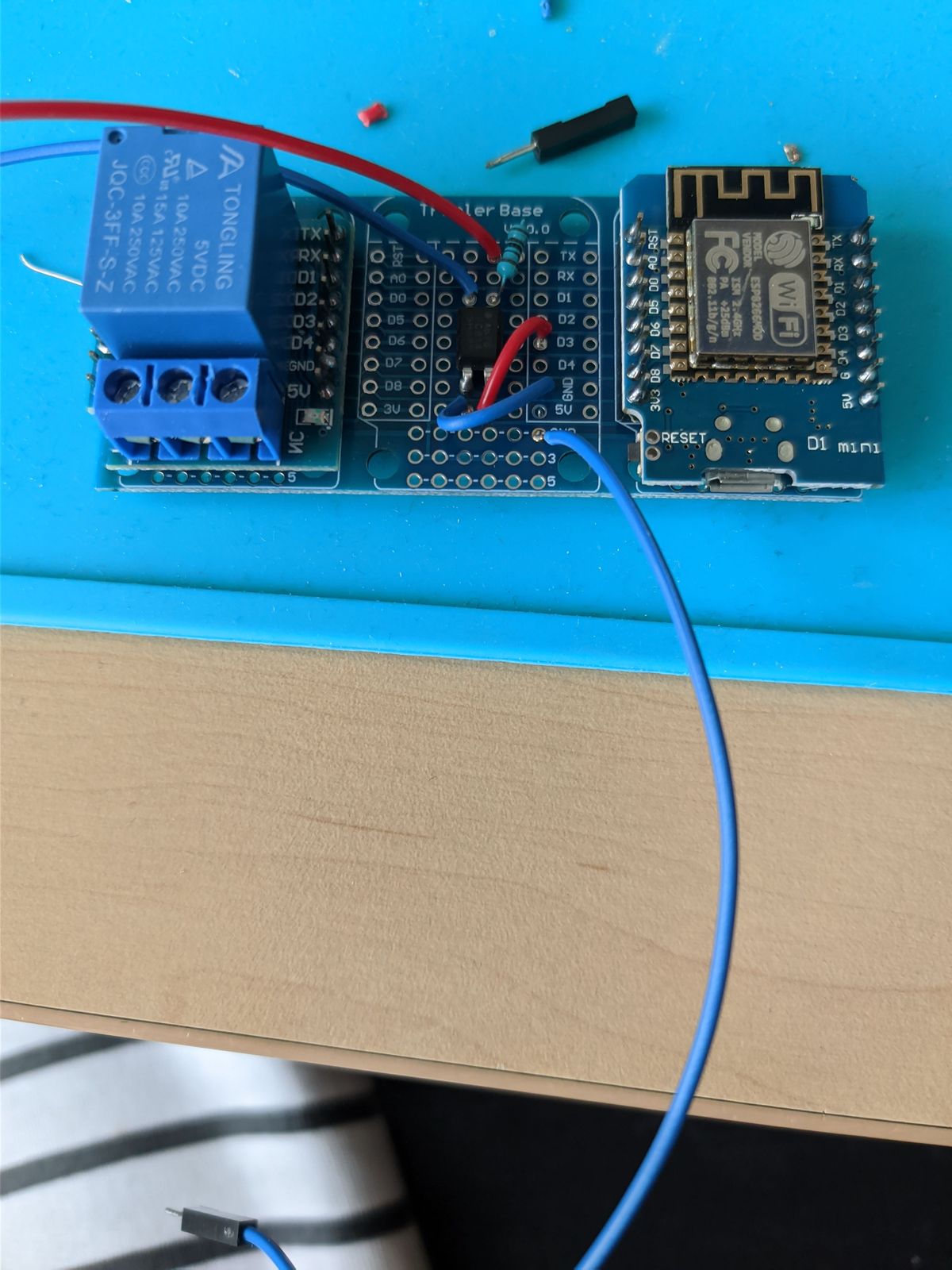
-
Hallo @Eisbaeeer ,
erstmal vielen Dank für deine Lösung!!!
Ich habe bei mir ein Siedle HTS 711-0 verbaut.
Aktuell möchte ich dies zwar noch nicht in mein Smart Home integrieren, aber ich bin sehr an einer Funk Klingel Erweiterung interessiert.Siedle bietet dafür den NSC 602-00 Adapter an. https://www.siedle.de/de-de/produkte/nsc-602-0-nebensignal-controller/
In meinen Augen ist das Abzocke...Jetzt meine Frage:
Kann ich deine Bauteile zur Klingelerkennung nutzen, um eine Funkerweiterung anzuschließen?
www.heidemann-handel.de/details-produkte/funkkonverter-hx.html
Den Rest für die Smart Home integration benötige ich aktuell nicht.Viele Grüße
TheHellSite